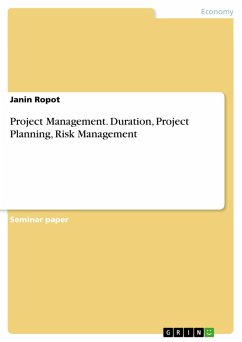
Introduction, Strengths and Weaknesses of Leading Project Management Standards and Frameworks (eBook, ePUB)
Sofort per Download lieferbar
Statt: 19,95 €**
16,99 €
inkl. MwSt. und vom Verlag festgesetzt.
**Preis der gedruckten Ausgabe (Broschiertes Buch)
Weitere Ausgaben:

PAYBACK Punkte
0 °P sammeln!
Seminar paper from the year 2009 in the subject Business economics - Business Management, Corporate Governance, grade: 1,3, University of Applied Sciences Berlin, language: English, abstract: What do the construction of the Pyramids of Giseh or of the Great Wall of China, Hannibal's Alps crossing and the Berlin Airlift have in common? These all are examples for famous and inspiring historical projects which would have never been realized without a profound planning, execution, coordination, and control. Mankind seems to have a lot of experience coming from fields like construction, engineering...
Seminar paper from the year 2009 in the subject Business economics - Business Management, Corporate Governance, grade: 1,3, University of Applied Sciences Berlin, language: English, abstract: What do the construction of the Pyramids of Giseh or of the Great Wall of China, Hannibal's Alps crossing and the Berlin Airlift have in common? These all are examples for famous and inspiring historical projects which would have never been realized without a profound planning, execution, coordination, and control. Mankind seems to have a lot of experience coming from fields like construction, engineering and defense on one hand. On the other hand we almost daily hear about projects that have failed or haven't met customers' expectations and as a result have even ruined whole companies and organizations. Every year 75 Billion US Dollars have been spent on failing projects only in IT-sector. Only 17 percent of all software projects done in the United States meet the original targets, 50 percent must have those target changed. All that happens today, when branches and industries are faced with rough economic and highly competitive environments with an increasing market concentration and fragility which shortens product life cycles and puts very strong requirements to costs and quality. To reduce risks of failure, to collect knowledge, to benefit from own and others' experiences and to give guidelines to the project personnel project management was systematically developed as an outstanding discipline with its' own standards and guides. The emergence and recognition of a distinct profession of project management has certainly been a strong driver in the development of standards and frameworks. The need to understand and to specify the role of the project manager himself, for a common terminology and the necessity of a common basis for employment and deployment of project personnel, working collaboratively, across functions in multidisciprinary teams; across organizations in strategic alliances and joint ventures; and across continents in global projects - these were the significant factors for the development of standards world wide . This Term Paper presents an overview of the leading project management standards and guides for project management knowledge and performance including a comparison of their content, strengths and weeknesses.
Dieser Download kann aus rechtlichen Gründen nur mit Rechnungsadresse in A, B, BG, CY, CZ, D, DK, EW, E, FIN, F, GR, HR, H, IRL, I, LT, L, LR, M, NL, PL, P, R, S, SLO, SK ausgeliefert werden.













